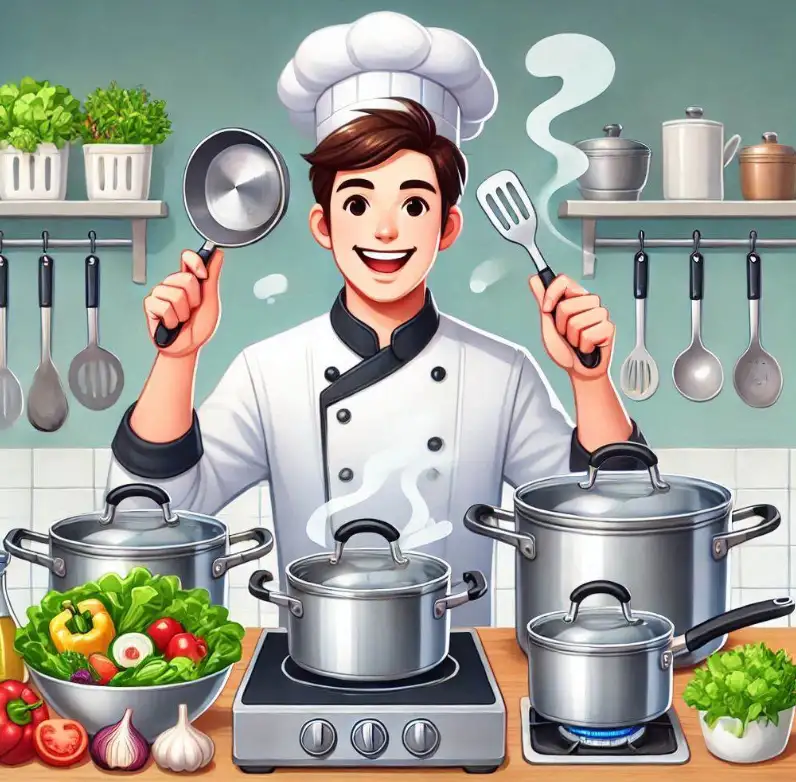Aluminum cookware is a staple in many kitchens, cherished for its affordability and excellent heat conductivity.
However, beneath its shiny exterior lies a potential risk that every mom should understand.
While widely used, aluminum cookware comes with some hidden downsides that might affect your family’s health.
Here’s what you need to know about the disadvantages of aluminum cookware and how to make safer choices in the kitchen.
1. Aluminum Leaching into Food
Cooking acidic or salty dishes in aluminum cookware can cause the metal to leach into the food.
The chemical reactions between aluminum and these types of ingredients increase the chances of contamination.
Over time, this exposure can contribute to an accumulation of aluminum in the body, which has been linked to health concerns such as:
- Neurological issues, including an increased risk of Alzheimer’s disease.
- Bone disorders, as aluminum competes with essential minerals like calcium.
Although regulatory agencies deem small amounts of aluminum exposure safe, repeated use of aluminum cookware may lead to long-term health risks.
2. Reactivity with Certain Foods

Aluminum reacts with both acidic and alkaline foods. This reaction can not only leach metal into your meals but also alter the flavor, giving your dishes an unpleasant metallic taste.
Common foods like tomatoes, citrus, and vinegar-based sauces are particularly prone to these reactions.
3. Durability Concerns
Aluminum cookware is prone to scratches and pits, especially when cleaned with abrasive materials or used with metal utensils. These imperfections can:
- Harbor bacteria, increasing the risk of contamination.
- Accelerate aluminum leaching into food.
To mitigate this, some cookware is anodized, creating a protective layer that reduces leaching. However, this coating can wear off over time, leaving the cookware vulnerable.
4. Not Suitable for High-Heat Cooking
If you love searing meats or baking at high temperatures, aluminum cookware might not be your best bet. Prolonged exposure to high heat can warp the material and degrade its quality, making it less effective and potentially unsafe.
5. Potential Allergic Reactions
In rare cases, some individuals may develop sensitivities to aluminum. This could lead to mild skin reactions or gastrointestinal discomfort. While uncommon, it’s an important consideration for families with a history of metal allergies.
6. Environmental and Longevity Factors
Aluminum cookware has a shorter lifespan compared to alternatives like stainless steel or cast iron. Frequent replacement contributes to environmental waste and long-term costs, making it less eco-friendly.
Safer Alternatives to Aluminum Cookware
If you’re concerned about aluminum exposure, consider switching to these safer options:
- Stainless Steel: Durable, non-reactive, and ideal for high-heat cooking.
- Cast Iron: Provides natural non-stick properties and adds iron to your diet.
- Ceramic or Glass: Perfect for non-reactive cooking and easy to clean.
For those who still prefer aluminum for its lightweight and heat distribution, investing in hard-anodized aluminum cookware is a safer choice.
This type of cookware has a protective layer that significantly reduces leaching.
Tips for Using Aluminum Cookware Safely
If replacing your aluminum cookware isn’t an immediate option, here are some practical tips to minimize risks:
- Avoid cooking acidic or salty foods in aluminum pots and pans.
- Use wooden or silicone utensils to prevent scratching the surface.
- Handwash your cookware with gentle cleaning tools to preserve its protective coating.
- Replace heavily scratched or damaged cookware promptly.
Aluminum cookware offers undeniable convenience, but its potential health risks make it worth a second thought.
While occasional use is unlikely to pose significant harm, long-term exposure to aluminum leaching can have adverse effects.
By staying informed and choosing safer alternatives, you can protect your family’s health without compromising on cooking efficiency.
Recommended Products for Safer Cooking
- Cuisinart Multiclad Pro Stainless Steel Cookware Set: A durable, non-reactive choice for everyday cooking.
- Lodge Pre-Seasoned Cast Iron Skillet: Perfect for high-heat searing and even heat distribution.
- GreenPan Ceramic Non-Stick Frypan: A toxin-free option for healthier cooking.
Upgrade your kitchen today with these high-quality alternatives for peace of mind and healthier meals!

